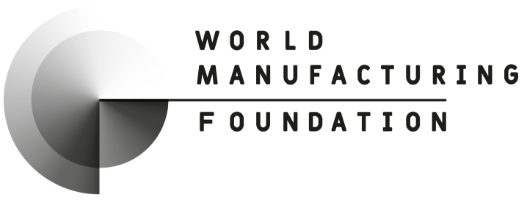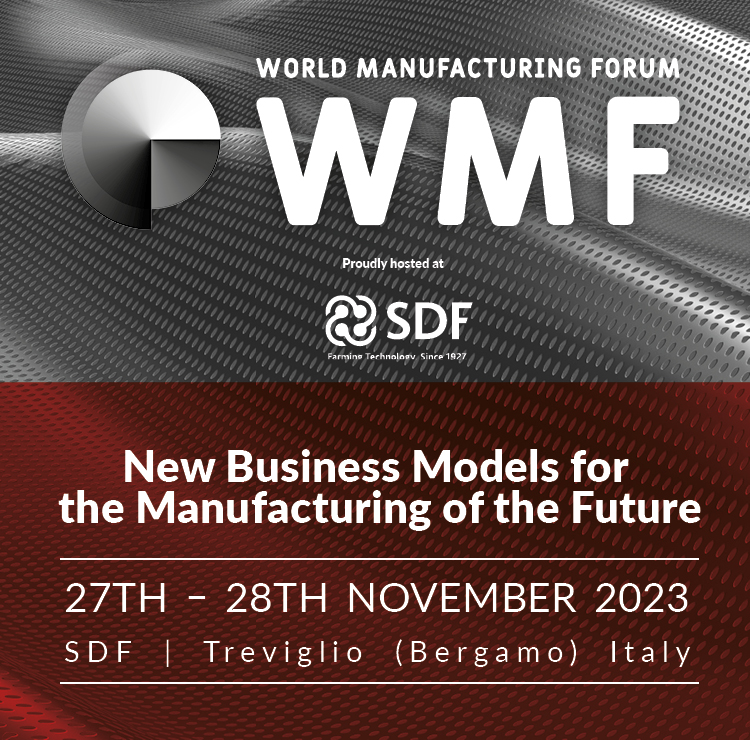

WMF 2023 Panels

World Manufacturing Forum 2023 – Panels
27-28 November 2023
New Business Models for the Manufacturing of the Future
Please join us as we present two days of the most important global industry conversations and networking opportunities, with multiple expert-led panel discussions on sustaining competitiveness and achieving long-term success in the manufacturing industry.
Event panel discussions will offer critical insights into the importance of new business and operating models to navigate the new complexities of reconfiguring global manufacturing value chains, outline best practices for developing a dynamic talent pipeline, and highlight the importance of fostering a culture of innovation, among much more.
Panel discussions will add to the presentation of the 2023 World Manufacturing Report “New Business Models for the Manufacturing of the Future” and the “State of Play for the Future of Manufacturing Businesses” keynote.
This Year's Panels
WMF Panel I: “The Great Rewiring of Global Manufacturing Value Chains and Its Impact on Operating Models”
Emerging trends, challenges, and opportunities are arising from the ongoing great rewiring of global manufacturing value chains. Geopolitical forces, such as trade tensions, regional alliances, and technological rivalries are redefining the rules of engagement for international businesses. Global manufacturing value chains are being restructured, and businesses are being compelled to re-evaluate their sourcing strategies, partnerships, and risk management approaches. This panel will provide critical insights into the importance of new business and operating models to navigate the new complexities of reconfiguring global manufacturing value chains, in the context of geopolitical disruptions, to enable businesses to seize competitive advantages and foster sustainable growth.
WMF Panel II: “The Economics of Innovation behind New Manufacturing Business Models and Their Technologies”
In today’s rapidly evolving manufacturing landscape, the pursuit of innovation is paramount for sustaining competitiveness and achieving long-term success. Now more than ever before envisioning a roadmap for sustainable growth is fundamental to thrive in an era of constant technological disruption. This panel will address the dynamic interplay between technological advancements, new business and operating models, and their economic implications. It will discuss how to strategically harness new technological wonders such as advanced robotics and automation, the internet of everything, as well as artificial intelligence for streamlining operations and unlocking new revenue streams. It will highlight the importance of fostering a culture of innovation by nurturing creativity and experimentation in the workforce to stay at the forefront of the industry with unique manufacturing practices.
WMF Panel III: “Attracting and Developing a Talent Pipeline for Socially Sustainable Business Models”
In the face of talent shortages and workforce skills gaps and shortfalls, qualified talent has become the most valuable asset for any business, and its development is a strategic requirement for achieving socially sustainable business models. This panel will provide actionable insights and best practices for developing a talent pipeline that aligns with the skills needed for adopting innovative manufacturing business and operating models. By prioritizing talent development and strategically nurturing a workforce that fosters a culture of innovation and environmental and social responsibility as core pillars of the next-generation business and operating models, manufacturing companies can lay the foundations for driving sustainable growth. A strong talent pipeline and an engaged workforce with a continuous learning and skills development culture can drive innovation, facilitate new technology adoption, and lead to the emergence of future-proof business models.
WMF Panel IV: “Achieving Net-Zero Value Chains for Sustainable Manufacturing Business Models”
With the global climate crisis intensifying, the obligation for adopting sustainable manufacturing practices, including regenerative systems, has never been more critical. This panel will put into action the net-zero value chain paradigm, where carbon emissions are balanced with removals, to create sustainable manufacturing business and operating models. The discussion will delve into the challenges and opportunities as well as best practices associated with transitioning towards net-zero value chains through innovative strategies and technologies for decarbonizing operations, optimizing energy use, and reducing waste in near-future circular supply chains. The goal is to embrace “net zero” as the core tenet of the business and operating models of all value chain stakeholders to proactively address the climate crisis and future-proof their businesses.
WMF Panel V: “Modern Service-Oriented Business Models for Customer-Centric Manufacturers”
In response to B2C and B2B customer preferences that prioritize convenience, flexibility, and cost-effectiveness, embracing service-oriented business models has become a new imperative for thriving in the global consumer goods and capital equipment markets. Adopting the modern “Product-as-a-Service” paradigm, also referred to as a “Product-Service System”, holds the key for customer-centric manufacturers to unlock new avenues of growth and value creation. This service-oriented value-creation approach shifts the focus from selling products to delivering comprehensive solutions and experiences to customers. These can transform one-time transactions into ongoing relationships that enhance customer loyalty and create recurring revenue streams. Service-oriented business models entail offering products on a subscription basis and enriching them with bundles of traditional and digital services during the middle and end of their lifecycles. By reimagining their current product-centric business models, manufacturers can position themselves at the forefront of their competitors by emphasizing outcomes and experiences over product ownership.
WMF Panel VI: “Innovative Business Models for Next-Generation Manufacturing Capital Equipment Builders”
As technology, globalization, and B2B customer expectations continue to reshape the global manufacturing industry, the traditional business and operating models of machine tool builders and tooling manufacturers face increasing challenges in meeting the demands of modern factories and their manufacturing systems. This panel will showcase how to forward-thinking and adopt innovative business and operating models to drive the success of next-generation businesses for machine tool builders and tooling manufacturers. It will demonstrate how cutting-edge business strategies, such as digitalization, servitization, and circular economy to mention a few can revolutionize the way machine tool builders and tooling manufacturers engage with their B2B customers and create value for them. Moreover, it will highlight the role of emerging digital and smart technologies such as the Industrial Internet of Things, Augmented Reality, Advanced Data Analytics, and Machine Learning in enabling these innovative business and operating models to unlock new revenue streams.